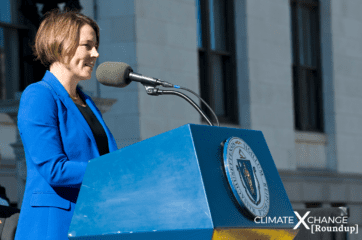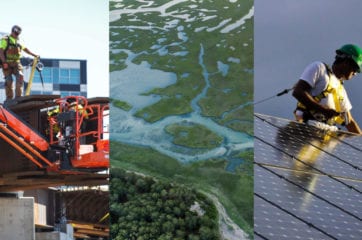Massachusetts has long been regarded as a leader in climate and energy policy. Since 2008, there has been a deliberate focus on carbon emissions through the Global Warming Solutions Act (GWSA) and the Green Communities Act. Since the GWSA was enacted, the Commonwealth has seen steep reductions in carbon emissions from the electric sector, which has lead to a decrease in overall emissions. Unfortunately, these policies have had smaller impacts on emissions from buildings and almost no effect on transportation. Today transportation accounts for 39% of emissions, and buildings another 28%. The GWSA requires that overall emissions be reduced 25% by 2020 and 80% by 2050. Based on the Governor’s most recent study, we are not on target to meet these legal mandates. This not only leaves the state vulnerable to future litigation, it also challenges our role as a clear leader on climate policy. In order to meet this requirement and and do our part to address the global climate crisis, Massachusetts must take aggressive steps to reduce emissions from these two sectors.
Keep Reading
An economy-wide carbon pollution price could move the state a long way toward meeting its mandates. It would require fossil fuel suppliers to pay pollution fees in proportion to the CO2 emissions of their products. This would give both suppliers and consumers a strong incentive to move to renewable energy and greater energy efficiency. The Massachusetts bills would devote most or all of the revenue to rebates for households and employers, with the House bill using a portion for investment in clean energy and transportation programs.
Such a carbon price is the most appealing option for Massachusetts for several key reasons. One, it can cut pollution greatly while protecting families, particularly low-income ones, and vulnerable businesses, due to the rebates and investment. Two, we keep in the state part of the $20 billion that consumers currently spend on out-of-state fuel imports from places like Texas, Pennsylvania, Saudi Arabia, and Nigeria. Three, consumers spend most of their fuel savings inside Massachusetts, growing the economy by $600 million a year and creating 18,000 jobs in the process. Four, there is widespread agreement among economists and policymakers that carbon pricing is the most cost-effective method of cutting emissions.
Carbon pricing legislation was first introduced the Massachusetts legislature in 2013 by Senator Mike Barrett and then-State Representative Tom Conroy. Although ambitious, the Conroy-Barrett bill caught the attention of climate leaders and concerned advocacy groups. In the next session in 2015 a new revenue-neutral bill was introduced by Senator Barrett. It was crafted with wider stakeholder input and supported by a new coalition, the Campaign for A Clean Energy Future, within which Climate XChange had (and continues to have) a leading role. This bill was also aided by a series of educational meetings with a delegation from British Columbia, which instituted revenue-neutral carbon fees in 2008. Together these events really put carbon pricing on the map in Massachusetts.
Building upon the solid foundation formed previously around Senator Barrett’s single bill, the 2017-2018 legislative session saw tremendous progress. In addition to Barrett in the Senate, State Representative Jen Benson introduced a bill in the House that used 20 percent of the revenues for clean energy investment. Collectively the bills received 79 cosponsors, about 40 percent of the legislature. Later in the session an omnibus climate bill, S.2302, An Act to Promote a Clean Energy Future, was sponsored by Senator Pacheco and contained provisions to institute carbon pricing that Senators Barrett and Pacheco worked out together. This bill was amended and passed unanimously by the State Senate. But the House did not vote on the bill, and it was not passed into law.
As we enter the 2019-2020 legislative session, Climate XChange is working closely with coalition partners, legislative allies, business leaders, and stakeholders. The momentum we’ve built over the past six years has created a solid foundation for success, and we expect that our legislative leaders will introduce Massachusetts’ strongest carbon pricing legislation to date. To learn more about the coalition that has come together to support carbon pricing, Visit Here.
Past Carbon Pricing Bills of the 190th Session (2017-2018)
Senator Michael Barrett’s Bill (S.1821)
This Session's Carbon Pricing Bills
H.2810 An Act to Promote Green Infrastructure and Reduce Carbon Emissions ǀ Sponsor: Representative Jennifer Benson ǀ Read the Bill ǀ Read the Factsheet
S.1924 An Act to Combat Climate Change ǀ Sponsor: Senator Michael Barrett ǀ Read the Bill ǀ Read the Factsheet
Environmental Justice Takes Center Stage in Massachusetts Legislative Session
The 2021–2022 legislative session in Massachusetts has seen an increased focus on environmental justice, with four exciting bills being introduced thanks to the hard work of organizers, advocates, and community leaders from across the state. These bills come on the...
Understanding the New Massachusetts Climate Law
After a year-long legislative push, a sweeping update to Massachusetts climate policy is now law. In short, the new law sets higher statewide goals to cut emissions, while creating opportunities for the state to better prioritize environmental justice, nudge utilities...
January 14th Roundup: Sunrise Endorses Wu for Mayor
[Not a subscriber? Sign up here] BEACON HILL HAPPENINGS –Today is the day: last day for Governor Baker to sign the climate bill (Tim Cronin): Governor Baker has less than 24-hours to sign a major climate bill that's been sitting on his desk...
Mass. Legislators Approve Landmark Climate Deal: Overview, Summary, & Context
**Update: This bill (S.2995) was vetoed by the Governor on 1/14/21. It was then re-filed (with the exact same bill text) on 1/19/21 as S.9. It was passed again by the Senate and House on 1/28/21 and sent back to...
June 30th Roundup: Heat Waves Hit Hard
[Not a subscriber? Sign up here] BEACON HILL HAPPENINGS – "Report: Framingham state Rep. Maria Robinson is being vetted for FERC" (Chris Van Buskirk, SHNS via MetroWest Daily News): "State Rep. Maria Robinson, D-Framingham, could be in the running for a federal post that...
June 18th Roundup: AG Maura Healey Wants Companies to Disclose Financial Risks of Climate Change
[Not a subscriber? Sign up here] BEACON HILL HAPPENINGS – Hearings begin next week on pollution, local energy bills (Tim Cronin): Even as statehouse leaders work through how to open the legislature back up, bills focused on indoor and outdoor pollution as well as local energy...
June 10th Roundup: Vehicular Air Pollution Claimed Hundreds of Lives in MA in 2016
[Not a subscriber? Sign up here] BEACON HILL HAPPENINGS – “Watchdogs On Alert Ahead of Climate Law Implementation” (Colin A. Young, SHNS via WWLP): [read the article] LOCAL IDEAS – “Time to prioritize offshore wind supply chain” by Patricia Haddad, via Commonwealth Magazine – “Solar gone wrong” by Margaret Sheehan,...
June 5th Roundup: Brookline Moves to Restrict Natural Gas, Again
[Not a subscriber? Sign up here] ALL POLICY IS LOCAL – New Report: Connecting Climate and Community Priorities (Christian Morris): A second new report from Climate XChange, this time co-authored by Fairmount-Indigo CDC Collaborative, seeks to understand how green investments in Massachusetts can best support...
Part II of our Latest Research: Investing in a Better Massachusetts
Conversations with Frontline Organizations on Connecting Climate and Community Priorities Over the course of January to March 2021, Climate XChange and Fairmount-Indigo CDC Collaborative engaged in conversations with frontline community leaders across Massachusetts. These discussions sought to understand the challenges they...
New Climate XChange Report: Investing in a Better Massachusetts
An Analysis of Job Creation and Community Benefits from Green Investments This report analyzes the potential job creation and quality of life benefits from investing in clean transportation, sustainable development, clean energy, energy efficiency, and natural resource conservation in Massachusetts. These...
How to Have Your Carbon Fee Cake and Eat It Too
Our analysis of Massachusetts Representative Jennifer Benson’s H.2810, An Act to Promote Green Infrastructure and Reduce Carbon Emissions, shows that while it imposes substantial fees on carbon pollution, creating incentives to reduce emissions, it will still financially protect low and...
Connect with us
Learn more about carbon pricing activity in Massachusetts by emailing us at info@climate-xchange.org
Are you a business leader? Sign onto our letter from businesses supporting carbon pricing in Massachusetts.
Join us at upcoming events
No events found













